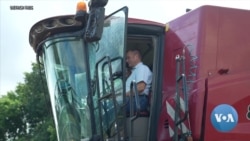ເມື່ອຣັດເຊຍຖອນໂຕອອກຈາກຂໍ້ຕົກລົງອາຫານປະເພດເມັດທະເລດຳ ໃນເດືອນກໍລະກົດຜ່ານມາ ປະເທດນີ້ກໍ່ໄດ້ເລີ່ມບຸກໂຈມຕີເມືອງທ່າໂອເດສຊາ (Odesa) ຢ່າງຕໍ່ເນື່ອງ. ສໍາລັບຊາວກະສິກອນຢູເຄຣນ ທີ່ເຮັດວຽກຢູ່ທີ່ນັ້ນແລ້ວ ສິ່ງນີ້ເປັນພຽງແຕ່ຄວາມທ້າທາຍອີກອັນນຶ່ງ ໃນຂະນະທີ່ພວກເຂົາພະຍາຍາມຫາລ້ຽງຊີບໃນຊ່ວງສົງຄາມ. ອານນາ ຄອສ໌ສຈຸຈເຈັນໂກ (Anna Kosstutschenko) ມີລາຍລະອຽດເພີ່ມເຕີມຈາກເຂດກີຢິບ, ເຊິ່ງອາດນະສັກ ຈະນຳ ລາຍລະອຽດມາສະເໜີທ່ານໃນອັນດັບຕໍ່ໄປ.
ທ່ານ ດີທຣິຈ ໄທຣສ໌ ເຊິ່ງເກີດຢູ່ເຢຍຣະມັນເປັນທີ່ປຶກສາອິດສະຫຼະດ້ານການປູກຝັງ ແລະ ກະສິກຳໃນຢູເຄຣນ ຕັ້ງແຕ່ປີ 2005.
ເມື່ອຣັດເຊຍບຸກລຸກຢູເຄຣນ, ທ່ານໄດ້ຕັດສິນໃຈທີ່ຈະຢູ່ໃນປະເທດນີ້ຕໍ່ໄປ ເຖິງແມ່ນວ່າຈະມີຄວາມສ່ຽງ ແລະ ໄດ້ໃຫ້ການສະໜັບສະໜູນແກ່ກອງກຳລັງປະກອບອາວຸດຂອງຢູເຄຣນ ນັບຕັ້ງແຕ່ມື້ທຳອິດຂອງສົງຄາມ. ໃນທ້າຍເດືອນມິຖຸນາຜ່ານມາ, ບໍລິສັດຂອງທ່ານໄດ້ຈັດກິດຈະກຳການກຸສົນເພື່ອສະໜັບສະໜູນກອງທັບຂອງຢູເຄຣນ. ທ່ານ ໄດ້ກ່າວເປັນພາສາອັງກິດວ່າ:
“ເງິນເອົາໄປຊື້ເຮືອບິນບໍ່ມີຄົນຂັບ ຫລື ໂດຣນ, ຂ້າພະເຈົ້າໄດ້ປະກອບສ່ວນໃນນາມສ່ວນຕົວ.”
ທ່ານ ໄທຣສ໌ ເຕີບໃຫຍ່ຢູ່ໃນຟາມໃນເມືອງບາແວເຣຍ (Bavaria). ທ່ານໄດ້ມາຢູເຄຣນຄັ້ງທຳອິດ ໃນປີ 1999 - ແລະເກີດຄວາມຮັກປະເທດນີ້. ໃນປີ 2017, ທ່ານໄດ້ເລີ່ມຕົ້ນເຮັດວຽກກັບ ໂຄງການກະສິກໍາເຢຍຣະມັນ - ຢູເຄຣນຂອງກະຊວງອາຫານ, ກະສິກຳ ແລະການປົກປ້ອງ ຜູ້ບໍລິໂພກຂອງລັດຖະບານກາງ. ທ່ານເຄີຍ ຂົນສົ່ງເມັດພືດຂອງທ່ານ ໄປທົ່ວໂລກໂດຍຜ່ານ ທະເລດໍາ. ແຕ່ການຍິງຖະຫລົ່ມຂອງຣັດເຊຍກຳລັງສ້າງຄວາມຫຍຸ້ງຍາກ, ແລະເຮັດໃຫ້ການຂົນສົ່ງອາຫານປະເພດເມັດທາງບົກນັ້ນມີລາຄາແພງຂຶ້ນ, ທ່ານກ່າວເປັນພາສາອັງກິດວ່າ:
“ຖ້າມັນໃຊ້ເວລາດົນ, ແລະ ສິ່ງອຳນວຍຄວາມສະດວກຂອງທ່າເຮືອຖືກທຳລາຍ ແລ້ວພວກເຮົາ - ບໍ່ພຽງແຕ່ຟາມຂອງພວກເຮົາເທົ່ານັ້ນ, ແຕ່ຊາວນາຊາວສວນຢູເຄຣນທັງໝົດ - ຈະປະເຊີນກັບບັນຫາ.”
ທ່ານ ໄທຣສ໌ ຄິດໄລ່ວ່າ ບໍລິສັດຂອງລາວອາດຈະສູນເສຍເງິນປະມານນຶ່ງລ້ານໂດລາ ພຽງແຕ່ຍ້ອນການປ່ຽນໄປໃຊ້ການຂົນສົ່ງທາງບົກເທົ່ານັ້ນ. ທ່ານຍັງມີຄວາມເປັນຫ່ວງອີກວ່າ ກອງກຳລັງຣັດເຊຍອາດຈະທຳລາຍອາຫານປະເພດເມັດທີ່ຢູ່ໃນທ່າກຳປັ່ນນັ້ນອີກ.
ທ່ານກ່າວຕື່ມວ່າ:
“ໃນເວລານີ້ຂອງປີໜ້າ, ຂ້າພະເຈົ້າຕ້ອງມີຮ້ານຄ້າເປົ່າຫວ່າງ ເພື່ອເກັບຜົນຜະລິດໃໝ່ຂອງຕົນ; ຂ້າພະເຈົ້າສາມາດເກັບເມັດພືດໄວ້ໄດ້ 2 ປີ ໂດຍທີ່ບໍ່ເນົ່າເສຍ ແຕ່ຂ້າພະເຈົ້າບໍ່ມີບ່ອນເກັບມ້ຽນ ສຳລັບລະດູເກັບກ່ຽວຄັ້ງຕໍ່ໄປ.”
ການຖອນໂຕອອກຈາກຂໍ້ຕົກລົງອາຫານປະເພດເມັດຂອງຣັດເຊຍ ໄດ້ສົ່ງຜົນກະທົບຕໍ່ຕະຫຼາດ ໂລກ. ແຕ່, ທ່ານກ່າວວ່າ ບັນດາປະເທດທີ່ທຸກຍາກກຳລັງໄດ້ຮັບຜົນກະທົບອັນໃຫຍ່ຫຼວງທີ່ສຸດ.
“ບັນດາປະຊາຊົນຜູ້ທຸກຍາກໃນໂລກຈະທຸກທໍລະມານເປັນເວລາຍາວນານ.”
ເຖິງແມ່ນວ່າຈະມີສົງຄາມ ແລະ ສະຖານະການການສົ່ງອອກທີ່ຄາດເດົາບໍ່ໄດ້, ທ່ານ ໄທຣສ໌ ກ່າວວ່າ ທ່ານບໍ່ມີແຜນການທີ່ຈະໜີຈາກຢູເຄຣນໄປ.
ອ່ານຂ່າວນີ້ເປັນພາສາອັງກິດລຸ່ມນີ້:
When Russia left the Black Sea grain deal in July, it began to continuously shell the port city of Odesa. For Ukrainian farmers working there, it was just another challenge as they try to make a living during wartime. Anna Kosstutschenko has more from the Kyiv region.
German native Dietrich Treis has been an independent consultant on farming and agriculture in Ukraine since 2005.
When Russia invaded Ukraine, he decided to stay in the country, despite the risks and has been supporting Ukraine’s armed forces since day one of the war. In late June, his company organized a charity event to support Ukraine’s military.
Mr. Dietrich Treis, DTC Agri-Consulting:
“Money went to buy drones, I personally contributed.”
Treis grew up at a farm in Bavaria. He came to Ukraine in 1999 for the first time – and fell in love with the country. In 2017, he started working with а German-Ukrainian agricultural project of the Federal Ministry of Food, Agriculture and Consumer Protection. He has been used to transporting his grain to the world via the Black Sea. But Russian shelling is making the difficult, and transporting grain over land is more expensive.
Mr. Dietrich Treis, DTC Agri-Consulting:
“If it takes long, and port facilities are destroyed, then we – not only our farm, but all Ukrainian farmers – will be in trouble.”
Treis calculates that his company could lose about a million dollars solely because of the switch to land transportation. He also worries Russian forces might destroy the grain that is sitting in ports.
Mr. Dietrich Treis, DTC Agri-Consulting:
“At this time next year, I have to have empty stores to store my new harvest; I can store grain for two years without it spoiling, but I don't have the storage for the next harvest.”
Russia’s leaving the grain deal affected the global market. But, he says, poor countries are feeling the biggest impact.
Mr. Dietrich Treis, DTC Agri-Consulting:
“The poor people of the world will suffer for a long time.”
Despite the war and the unpredictability of the export situation, Treis says he has no plans to leave Ukraine.





